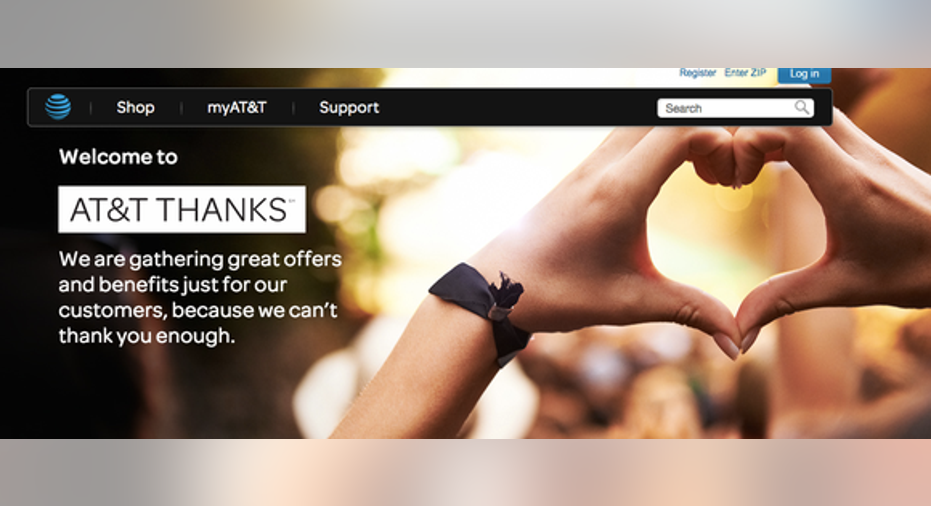Citi Wants AT&T to Stop Saying Thanks

While it's rare enough that a company thanks its customers for their business,Citigroup(NYSE: C) wants to barAT&T(NYSE: T) from using the word in its ads.
The bank has had a program called "ThankYou from Citi" since 2004, for which it has multiple trademarks, according to Consumerist. Citi claims that AT&T's new AT&T Thanks program violates its trademark.
Citigroup wants AT&T to stop using the words "thanks" or "thank you" and asked for a preliminary injunction that would prohibit the use of those terms until the case comes to trial. Katherine Forrest, a federal judge in the United States District Court in the Southern District of New York, issued a ruling denying the financial institution's request on Aug. 11.
That does not mean Citigroup will lose the case, but it does allow AT&T to keep promoting its loyalty program, which rewards customers who bundle wireless and pay-television service, until the issue is settled.
"At this stage it is Citigroup's burden to prove its entitlement to the substantial remedy of preliminary injunctive relief. On the record as it currently stands, Citigroup has not carried its burden," wrote the judge.
AT&T's promotion uses the word "Thanks." Image source: AT&T.
Why was Citi's motion denied?
In her decision, Forrest noted that Citigroup has offered its customer loyalty program in connection with a number of its credit cards since 2004 using the trademarks and brands "Thank You," "Citi Thank You," "Citi Business Thank You," "Thank You From Citi, and "Thank You Your Way." She explained that these trademarks are all registered with the United States Patent and Trademark Office, and "Citigroup has implemented an enforcement program aimed at protecting its rights in the marks."
Citi is not alone in having trademarks involving the words thank you and when it initially applied for the marks, it had to show that its use of them "avoids any likelihood of confusion," with what was then known as UBS PaineWebber and New South, two companies that at the time offered banking services.
In that case,Citigroup won its trademark by arguing thatwhile all three companies "share certain commercial and personal banking services," neither earlier-registered mark "recite[d] credit card services."
It may be that argument -- that customers won't be confused because the companies are in different businesses -- that ultimately lets AT&T win rights to use the word "thanks." It's hard to argue that a financial services/bank/credit card company is in the same business as a wireless, pay-television, and broadband provider and that consumers confuse the two offers.
It's worth noting, however, that Citi and AT&T have had co-branded credit cards since 1998, carrying both of their logos. The judge acknowledged that approximately 1.7 million consumers who hold these cards receive monthly bills carrying both companies logos and the "Thank You," and "Thank You from Citi" trademark.
Enrollment has been frozen in the credit card programs and no new members are being accepted.
What happens next?
AT&T and Citigroup have both put forward different timelines as to when the telecommunications company told its sometimes partner that it intended to use the phrase thank you. Forrest seemed, in her ruling, to agree with AT&T's timeline, but ultimately the judge noted it's not a case of when the financial company knew but whether it can show "evidence of actual confusion by consumers."
To make its case,Citigroup shared a number of online complaints about the AT&T program, saying that it could reflect negatively on the financial company.
"In the Court's view, these examples tend to disprove, rather than bolster, Citigroup's theory of irreparable harm," wrote the judge. "All of the complaints Citigroup has compiled are attached to announcements of the 'AT&T thanks' loyalty program, but most relate to aspects of AT&T's core telecommunications services, such as phone purchase options and data plan prices, rather than the loyalty program itself. Where these online comments do discuss the loyalty program, they compare it to loyalty programs offered by other telecommunications companies."
To win the case in the end, Citigroup will have to show that AT&T's use of the terms thanks or thank you will cause it irreparable harm, which legally requires that "the injury alleged to be irreparable must beactual and imminent, not merely possible."
That seems like a long shot, at least given Judge Forrest's opinion.
"The evidence of irreparable loss of reputational control Citigroup has advanced in support of the instant motion is much less convincing," she wrote. "As discussed below, to date there is no evidence of actual confusion by consumers."
That's the meat of the judge's argument, but she was clearly unimpressed with Citigroup's claims and went on for pages explaining why. That does not mean Citi will ultimately lose, but it's clear that the financial company has not yet made a compelling case as to why AT&T should not use the words thanks or thank you.
A secret billion-dollar stock opportunity The world's biggest tech company forgot to show you something, but a few Wall Street analysts and the Fool didn't miss a beat: There's a small company that's powering their brand-new gadgets and the coming revolution in technology. And we think its stock price has nearly unlimited room to run for early in-the-know investors! To be one of them, just click here.
Daniel Kline has no position in any stocks mentioned. He thinksAlanis Morissettehas prior claim to the words "Thank you."The Motley Fool has no position in any of the stocks mentioned. Try any of our Foolish newsletter services free for 30 days. We Fools may not all hold the same opinions, but we all believe that considering a diverse range of insights makes us better investors. The Motley Fool has a disclosure policy.



















